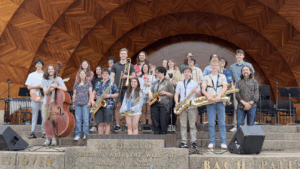Nola Minogue ‘21
December 12, 2019
For years, the Accomplish Program at BHS has been responsible for the collection of recycling throughout the school, each morning knocking on teachers’ doors for the acquisition, or delivering the Salem News. But this year, the Accomplish Program took on a new undertaking- the measurement and assortment of the trash from the cafeteria following the three daily lunches. The baseline statistics were: 195.8 pounds per day and 5.5 pounds per day. The main culprit of this amount of trash was food waste, along with disposable lunch trays and utensils. Students in the past have had no option other than a trash and recycling bin to dispose of their lunch- until now.
At the beginning of the year, teachers Adrienne Manis and Molly Benson launched the next phase of the recycling program: composting. Both graduates of BHS, they’ve observed for years the attitude around installing a composting program. “It’s always boggled my mind that we’d been saying the same things, teaching the kids the same things, yet our behavior hadn’t changed,” said Benson. “When we decided we wanted to compost, we didn’t just want to compost at the high school and do it one year and have it be gone; the goal was to make this something that stays at the high school forever. We can then use the data we’ve collected to inform the other schools in the district what the most effective interventions we have tried have been.”
The teachers received a grant from the Beverly Education Foundation to start the project and were then awarded another $500 grant for research, based on their research design. Benson is also a behavior analyst, and she and Manis have been long time teachers of the Accomplish Program. The implementation of the program has provided them with an opportunity to conduct and share their own research aimed at achieving a more comprehensive understanding of waste diversion on public school campuses. With support from Principal Taylor and the recycling program already in place, the students were in a position to enact the composting initiative, as “Environmental Engineers”.
Since the start of the program, there has been an average waste diversion of 68.5%. With the introduction of a composting bin in the cafeteria at all three lunches, the amount of trash has gone down to 64.5 pounds, as composting is now 109.33 pounds per day and recycling has risen to 13.25 pounds.
The plan of attack for furthering the composting program has been separated into three phases: education, feedback, and prompting. “At the end, we can determine [which phase] was the most effective, and can go to other schools and say “just do this”,” commented Manis on the enactment of the three phases. As of December 5th, the education portion was still in place, with the numbers of what has become of the amount of waste in the school to be released the following week. The data collected from the research and work of the Environmental Engineers is that, in two weeks of launching the program, there has been an average waste diversion of 68.5%. With the introduction of a composting bin in the cafeteria, the amount of trash has gone down to 64.5 pounds, as composting is now 109.33 pounds per day and recycling has risen to 13.25 pounds.
The program has also had a positive impact on the students of the Accomplish Programs, who have been the ones sorting through recycling and trash to collect data and record it. “Every subject area that you could teach students, we’re doing just through this composting program,” said Manis on the connection between the program and math, English, science, even history- the students had to research different recycling programs of the past and the present. “There’s this sense of pride that goes with running a program that benefits the entire school,” stated Benson.


